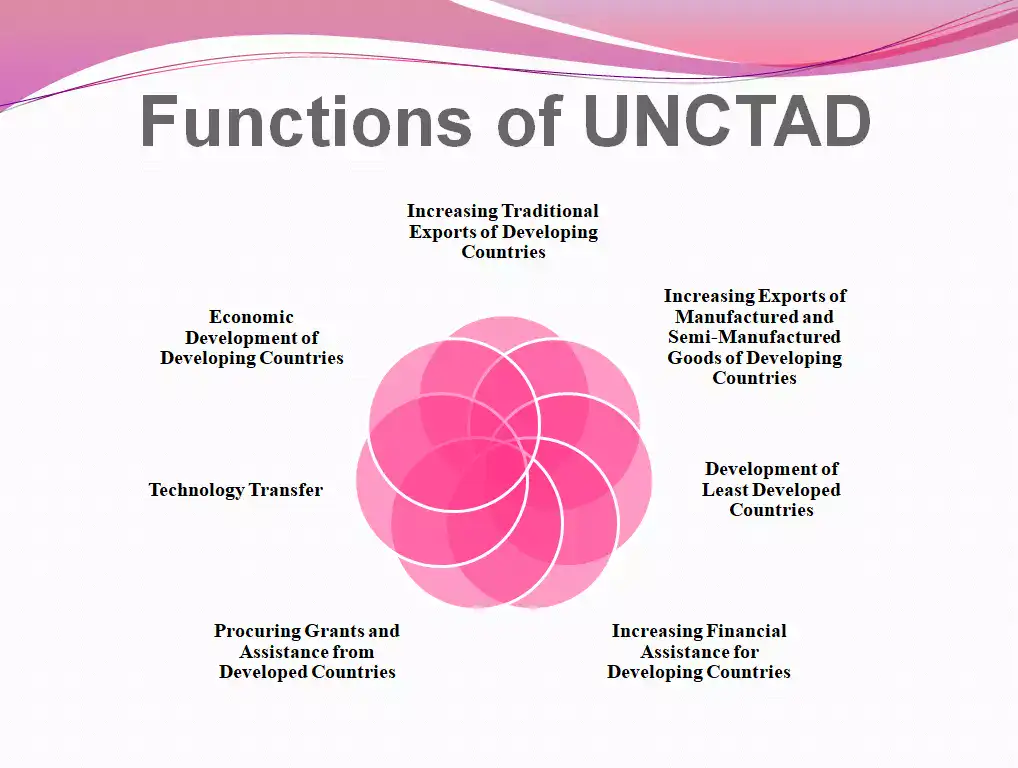Table of Contents:-
- United Nations Conference on Trade and Development
- Objectives of UNCTAD
- Principles of UNCTAD
- Organisational Structure of UNCTAD
- Functions of UNCTAD
UNCTAD: United Nations Conference on Trade and Development
The United Nations Conference on Trade and Development (UNCTAD) is an intergovernmental organization that operates within the United Nations Secretariat. within the United Nations Secretariat. Its primary objective is to promote the interests of developing countries in global trade.
UNO declared 1960-70 as Development Decade. In 1961 UNO attempted to increase the income of developed tries with a growth rate of 5% pa during this development decade. In July 1962, a conference of developing countries was held at Cairo, where a resolution was passed to convene a World Conference with the same objective. The Economic and Social Council of the United Nations (UN) convened a World Trade and Development Conference, which was held between March 31, 1964, to June 16, 1964.
A worldwide international trade policy was established during this conference. Various issues related to the expansion of international trade in developing countries were also discussed at this Conference. This Conference is known as UNCTAD. The UNCTAD was established as a permanent organ of the UN General Assembly. The UN General Assembly also defined the functions, activities and membership of the UNCTAD Head-quarters of UNCTAD in Geneva, UNCTAD-I was held in Geneva in 1964. Since then such conferences have been held normally after every four years.
Related Articles:
- nature of business meaning
- nature of international business
- scope of international marketing
- determinants of economic development
- nature of capital budgeting
- nature of international marketing
| Conferences | Places | Year |
| UNCTAD-I | Geneva | 1964 |
| UNCTAD-II | New Delhi | 1968 |
| UNCTAD-III | Santiago | 1972 |
| UNCTAD-IV | Nairobi | 1976 |
| UNCTAD V | Manila | 1979 |
| UNCTAD-VI | Belgrade | 1983 |
| UNCTAD VII | Geneva | 1987 |
| UNCTAD-VIII | Columbia | 1992 |
| UNCTAD-IX | Midrand (South Africa) | 1996 |
| UNCTAD-X | Bangkok (Thailand) | 2000 |
| UNCTAD-XI | Sao Paulo | 2004 |
| UNCTAD-XII | Ghana | 2008 |
| UNCTAD XII | Qatar | 2012 |
Objectives of UNCTAD
UNCTAD works to achieve the following objectives as laid down by the UN General Assembly:
1) To make proposals and programmes for implementing its policies in the area of promoting economic development in developing countries.
2) Formulate principles and policies for solving problems of international trade.
3) To negotiate and adopt multilateral trade agreements (trade agreements among many countries) with due regard to the existing international organisations like IMF, World Bank, GATT, etc.
4) To help the developing countries to get remunerative prices for their exports of primary and manufactured goods to solve the balance of payment problem of these countries.
5) To review and coordinate activities of other institutions within the United Nations system in the field of international trade, foreign aid and economic development.
6) To harmonise the trade and related development policies of different member nations with regional economic groupings like SAARC, ASEAN, etc.
7) To promote international trade and accelerate economic development in developing countries.
Basic Principles of UNCTAD
UNCTAD action program and priorities have been laid down in the various recommendations adopted by the first conference in 1964.
The key principles are:
1) Every country has the sovereign right to freely dispose of its natural resources in the interest of the economic development and well-being of its people and freely trade with other countries.
2) Economic relations between countries, including trade relations, shall be based on respect for the principles of self-determination of people, sovereign equality of states, and non-interference in the internal affairs of other countries.
3) There shall be no discrimination based on differences in socio-economic systems, and the adoption of various methods and trading policies shall be consistent with this principle.
4) Economic relations between countries shall be based on respect for the principle of sovereign equity of all states, self-determination and non-interference in domestic affairs.
5) Every country has the sovereign right freely to trade with other countries, and dispose of its natural resources in the interest of the economic development and well-being of its people.
6) Economic development and social progress should be the common concern of the whole international community.
7) Developed countries should assist developing countries to speed up their economic and social progress and should encourage appropriate adjustments in their economies to this end.
8) The adoption of international policies and measures for the economic development of developing countries shall take into account the individual characteristics and different stages of development of the developing countries, special attention being paid to the less developed countries among them.
Organisational Structure of UNCTAD
The organisational structure of UNCTAD is as follows:
1) Leadership Transition
The UNCTAD secretariat is headed by a Secretary-General. After the departure of Mr Rubens Ricupero (Brazil), who was Secretary-General of UNCTAD until 14 September 2004, the Officer-in-Charge of UNCTAD is Mr. Carlos Fortin (Chile).
2) Divisions and Special Programs
The secretariat has around 400 staff members and is divided into five divisions, of which four are focused on the substantive research and technical assistance work of the secretariat, while the fifth handles management and intergovernmental affairs and outreach. In addition, a special programme is exclusively devoted to addressing the challenges faced by the least developed countries.
3) Division of Management
It includes the Administrative Service, the Technical Cooperation Services and the Intergovernmental Affairs and Outreach Service, which services the intergovernmental meetings taking place at UNCTAD.
4) Division on International Trade in Goods and Services, and Commodities (DITC)
It covers trade in goods and services, commodities, competition policies and the link between trade and the environment. The division also carries out capacity-building activities on trade-related matters for developing countries, and it provides substantive services to the Commission on Trade in Goods, Services and Commodities.
5) Division on Investment, Technology and Enterprise Development (DITE)
It covers investment issues, enterprise development and technology matters. It is responsible for UNCTAD’s annual World Investment Report and services the Commission on Investment, Technology and Related Financial Issues, as well as the Commission on Science and Technology for Development.
6) Division on Globalisation and Development Strategies (GDS)
It covers macroeconomic and development policies. It also houses the UNCTAD statistical office and a special unit covering issues related to Africa. The division is responsible for publishing UNCTAD’s annual Trade and Development Report, which is discussed at the regular sessions of the Trade and Development Board.
7) Division on Services Infrastructure for Development and Trade Efficiency (SITE)
It covers a variety of trade facilitation issues, including transport, customs procedures, provision of trade-related information, and e-commerce. The work of the division has a strong technical assistance component. The division is responsible for the publication of the annual E-Commerce and Development Report and the Review of Maritime Transport.
8) Special Programme for Least Developed, Landlocked and Island Developing Countries (LDC)
It coordinates UNCTAD’s work on these categories of countries It also provides analyses of the broad development challenges facing these countries and delivers technical assistance. Every two years, the Special Programme publishes ‘The Least Developed Countries Report’.
Functions of UNCTAD
The following are the main roles and functions of UNCTAD:
1) Increasing Traditional Exports of Developing Countries
Developing countries want to expand the market for their traditional exports of primary commodities; but developed countries impose restrictions on the exports of the developing countries in the form of licensing, quotas, tariffs, packaging regulations, etc. Consequently, there has been a continuous deterioration in the terms of trade of primary products of the developing countries.
2) Increasing Exports of Manufactured and Semi-Manufactured Goods of Developing Countries
For increasing exports of manufactured and semi-manufactured goods, developing countries strongly urged the developed countries to give tariffs and other preferences. UNCTAD urged for an early establishment of a Generalised System of Preference (GSP) for the benefit of developing nations.
3) Development of Least Developed Countries
Special measures have been taken for the development of the least developed countries designated by the United Nations as the ‘Hardcore Countries’. These countries should receive high priority and a greater share of official development assistance. UNCTAD has asked the aid agencies to adopt suitable measures for the development of these least-developed countries.
4) Increasing Financial Assistance for Developing Countries
UNCTAD was set up to increase financial assistance from international financial institutions and developed countries to increase the rate of economic development of developing countries. The World Bank and regional development financial institutions (like the Asian Development Bank) were invited by UNCTAD to provide more financial assistance to developing countries. Efforts would be made to procure more funds from developed countries and international financial institutions to improve the infrastructure of developing countries.
5) Procuring Grants and Assistance from Developed Countries
UNCTAD stressed that each developed country should contribute 1% of its GNP at market price as development assistance to the developing countries.
6) Technology Transfer
Developed countries have modern technology, better research facilities, training programmes, and technology development centres while developing countries are lacking in it. Technology transfer from developed countries to developing countries is a must for the speedy and self-reliant development of developing countries. Technology transfer is a must for the rapid enlargement of the domestic ability of developing nations to produce capital goods. UNCTAD urged the developed countries to give developing countries access to high technology which is crucial for the development of underdeveloped countries.
7) Economic Development of Developing Countries
UNCTAD works for the economic development of developing countries. Other international institutions such as IMF, World Bank, and GATT favoured the developed countries and failed to tackle the special trade and development problems of the developing countries. It was recognised right from UNCTAD-1 that the economic development of developing countries should be the common concern of the whole international community.
8) Solving the Debt Problem of Developing Countries
The accumulated debt of the developing countries was beyond the repaying capacity of many of these countries. Least developed countries wanted the repayment schedule of their debts should be revised and they should be given more time to repay such debts. They also demanded that certain amounts of loans be converted into grants. ‘Grants’ here means financial assistance given by one nation to another which is not being repaid. UNCTAD stressed the need to change the lending policies of the IMF and World Bank in the interest of developing countries.

You May Also Like:-
Theories of International Trade
Bilateral and Multilateral Trade Agreements
International Human Resource Management
International Financial System
International Commodity Agreements
International Trading Environment
Scope of International Marketing
Determinants of Economic Development
Impact of Globalisation on International Business
International Business Environment
Complexities of International Business
Difference between Domestic and International Business
Importance of International Business
Modes of Entry into International Business
Factors Affecting International Business
Major Reasons for International Business
